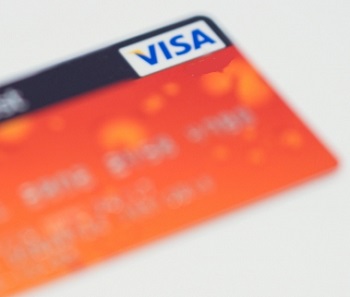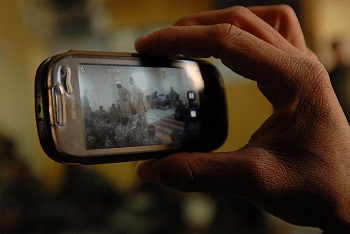Visa Checkout service has been improved to highlight the convenience of mobile commerce
Visa wants to make the mobile commerce process faster and is working to improve its Visa Checkout service. Visa Checkout was first introduced in 2014 as a way for Visa to compete with PayPal and other companies. The service allows merchants to embed interactive buttons on their sites and mobile applications, allowing consumers to make payments without having to navigate away from these sites or apps. The service had succeeded in generating strong support among consumers, but Visa is keen to make the service faster in order to highlight the convenient nature of mobile payments.
Payments made through Visa Checkout will now be faster
When Visa Checkout was first launched, consumers would have to input a username and password in order to complete a transaction. Now, however, the service has been updated to require only a password. Customers using the service now see a picture of a card where the Visa Checkout button used to be. Swiping right on the card on a mobile device asks users to input a password and this makes the mobile payments process much quicker.
Access to Visa Checkout is expanding to more merchants interested in connecting with mobile shoppers
 Visa is also expanding access to its Visa Checkout service. When first launched, Visa Checkout was only available to merchants selling digital goods and services. Some merchants were able to use the service if they delivered goods to physical stores for later pickup. Now, Visa Checkout can be used by merchants that ship products directly to customers over the next few months. Visa expects that this will be a big hit with mobile shoppers, who are already convinced of the convenience of mobile commerce.
Visa is also expanding access to its Visa Checkout service. When first launched, Visa Checkout was only available to merchants selling digital goods and services. Some merchants were able to use the service if they delivered goods to physical stores for later pickup. Now, Visa Checkout can be used by merchants that ship products directly to customers over the next few months. Visa expects that this will be a big hit with mobile shoppers, who are already convinced of the convenience of mobile commerce.
Visa is making mobile commerce more secure and convenient
Convenience is one of the most attractive aspects of the mobile payments field. Many consumers have opted to use their smartphones to shop for and purchase products due to this convenience. Visa has also succeeded in making the mobile commerce space safer for consumers, which has further encouraged their participation in this sector.
While it may not seem strange to see weapons in a soldier’s equipment, smartphones are a new addition.
Union Minister Haribhai Parathibhai Chaudhary has now announced that troops who are deployed along India’s international borders and in areas hit by Maoist attacks will soon be receiving secure mobile phones as a part of their standard equipment.
Since even those whose deployments are to rather remote areas still receive cell service, this could be helpful.
The secure mobile phones will even be issued to security personnel who are located in areas that have only short-term occasional connections. Chaudhary explained that “We are planning to provide secure mobile phones to all security personnel deployed along the borders and Naxal-affected areas so that they can keep in touch with their family via 3G connection.” It would not be possible for the mobile technology to be intercepted, he said, because the telephone exchange would be carried by the battalions wherever they go instead of being kept in a fixed position as is the case with traditional networks.
The secure mobile phones have received the approval of an American company that has said the tech is ready.
 A delegation from that U.S. based company met with Chaudhary, at which time the company claimed that it was prepared to provide the cell phone exchange within a portable box. That would make it possible for security personnel to access any of over 1,000 secure mobile connections per box.
A delegation from that U.S. based company met with Chaudhary, at which time the company claimed that it was prepared to provide the cell phone exchange within a portable box. That would make it possible for security personnel to access any of over 1,000 secure mobile connections per box.
When meeting with another delegation from yet another American company, Chaudhary also arranged to obtain blood testing equipment that would make it possible for blood tests to be taken and processed within a span of a handful of minutes, providing security personnel with a vital way to save time in this task.
This introduction and adoption of the new mobile technology is a part of a broader effort from the central government to prevent cyber crime as it becomes available through the evolution of the latest tech. Chaudhary pointed out that the laws in the country have yet to directly address the prevention of cyber-crime and that, beyond the secure mobile phones, the government has now launched a judicial process designed to create new legal regulations that will align with the advancement of technology.
 Visa is also expanding access to its Visa Checkout service. When first launched, Visa Checkout was only available to merchants selling digital goods and services. Some merchants were able to use the service if they delivered goods to physical stores for later pickup. Now, Visa Checkout can be used by merchants that ship products directly to customers over the next few months. Visa expects that this will be a big hit with mobile shoppers, who are already convinced of the convenience of mobile commerce.
Visa is also expanding access to its Visa Checkout service. When first launched, Visa Checkout was only available to merchants selling digital goods and services. Some merchants were able to use the service if they delivered goods to physical stores for later pickup. Now, Visa Checkout can be used by merchants that ship products directly to customers over the next few months. Visa expects that this will be a big hit with mobile shoppers, who are already convinced of the convenience of mobile commerce.
 A delegation from that U.S. based company met with Chaudhary, at which time the company claimed that it was prepared to provide the cell phone exchange within a portable box. That would make it possible for security personnel to access any of over 1,000 secure mobile connections per box.
A delegation from that U.S. based company met with Chaudhary, at which time the company claimed that it was prepared to provide the cell phone exchange within a portable box. That would make it possible for security personnel to access any of over 1,000 secure mobile connections per box.